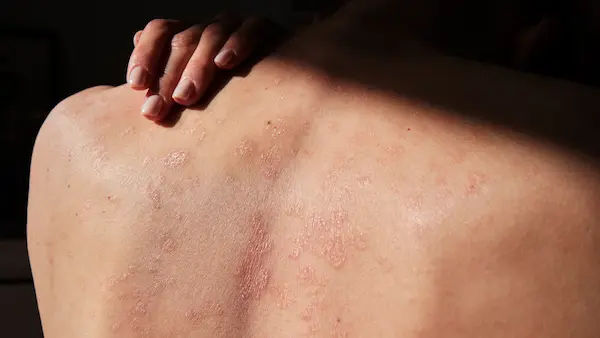Understanding Psoriasis Symptoms, Causes, and Types
Psoriasis is more than just a skin condition. Understand the common symptoms, key causes, and different types of psoriasis to better manage your skin health.


Psoriasis is a chronic skin condition that affects millions of people worldwide. If you or someone you know has been diagnosed with psoriasis, you might have questions about what it is, why it happens, and how to manage it. This article will help you understand psoriasis in simple terms, covering its symptoms, causes, types, and ways to improve your quality of life.
What is Psoriasis?
Psoriasis is an autoimmune condition where the immune system mistakenly attacks healthy skin cells, causing them to multiply too quickly. Normally, skin cells grow and shed over weeks, but in psoriasis, this process happens in just a few days. The extra skin cells build up on the surface, forming thick, scaly patches that can be red, itchy, and sometimes painful.
While psoriasis is not contagious, it can be a lifelong condition with periods of flareups and remission. The good news is that with proper care, psoriasis can be managed effectively.
Common Symptoms of Psoriasis
Psoriasis symptoms can vary from person to person, but some common signs include:
- Red, raised patches of skin (plaques) covered with silvery white scales
- Dry, cracked skin that may bleed
- Itching, burning, or soreness around affected areas
- Thickened or pitted nails (in some cases)
- Swollen and stiff joints (if psoriatic arthritis develops)
These symptoms most commonly appear on the scalp, elbows, knees, and lower back, but they can occur anywhere on the body.
What Causes Psoriasis?
The exact cause of psoriasis is still being studied, but experts believe it results from a combination of genetic and environmental factors. Some key triggers include:
- Family history – If a parent or sibling has psoriasis, you may be more likely to develop it.
- Immune system dysfunction – The body’s defense system mistakenly attacks healthy skin cells.
Stress – Emotional or physical stress can trigger flareups. - Infections – Strep throat or skin infections can worsen psoriasis.
- Skin injuries – Cuts, burns, or bug bites may trigger new patches (Koebner phenomenon).
- Weather changes – Cold, dry weather often makes symptoms worse.
- Smoking and alcohol – These can increase the risk and severity of psoriasis.
Consult a General Physician for best advice
Different Types of Psoriasis
There are several types of psoriasis, each with distinct characteristics:
1. Plaque Psoriasis (Most Common)
- Appearance: Thick, red patches with silvery scales.
- Location: Elbows, knees, scalp, and lower back.
2. Guttate Psoriasis
- Appearance: Small, dotlike lesions.
- Common in: Children and young adults, often triggered by infections like strep throat.
3. Inverse Psoriasis
- Appearance: Smooth, red patches in skin folds (armpits, groin, under breasts).
- Worsened by: Friction and sweating.
4. Pustular Psoriasis
- Appearance: White, pusfilled blisters surrounded by red skin.
- Can be: Localized (hands/feet) or widespread (whole body).
5. Erythrodermic Psoriasis (Rare but Serious)
- Appearance: Widespread redness covering large areas of the body.
- Requires: Immediate medical attention as it can lead to severe complications.
6. Psoriatic Arthritis
- Symptoms: Joint pain, stiffness, and swelling along with skin symptoms.
- Can lead to: Permanent joint damage if untreated.
How to Manage Psoriasis?
While there is no cure for psoriasis, the right treatment and lifestyle changes can help control symptoms and improve quality of life.
Medical Treatments
- Topical creams (steroids, vitamin D analogs) to reduce inflammation.
- Phototherapy (light therapy) under medical supervision.
- Oral or injectable medications for severe cases (biologics, immunosuppressants).
Lifestyle & Home Remedies
- Moisturize regularly – Helps reduce dryness and itching.
- Avoid triggers – Stress, smoking, alcohol, and skin injuries.
- Eat a balanced diet – Antiinflammatory foods (fruits, vegetables, omega 3s) may help.
- Get sunlight (in moderation) – Natural UV light can improve symptoms.
- Manage stress – Yoga, meditation, and relaxation techniques can help.
When to See a Doctor?
If you notice persistent skin changes, joint pain, or worsening symptoms, consult a dermatologist. Early diagnosis and treatment can prevent complications.
Need Expert Help?
If you suspect psoriasis or need personalized care, you can book a consultation with a dermatologist through Apollo 24|7. They offer expert advice and treatment plans tailored to your needs.
Final Thoughts
Living with psoriasis can be challenging, but understanding the condition and taking proactive steps can make a big difference. With the right treatment and selfcare, many people lead healthy, fulfilling lives despite psoriasis.
If you have concerns about your skin health, don’t hesitate to seek professional help. Remember, you’re not alone—support and effective treatments are available!
Would you like to schedule a consultation or learn more about managing psoriasis? Visit Apollo 24|7 today for expert guidance.
Stay informed, stay healthy!
Consult a General Physician
Consult a General Physician

Dr Syed Mateen Pasha
General Physician
2 Years • MBBS
Bengaluru
PRESTIGE SHANTHINIKETAN - SOCIETY CLINIC, Bengaluru

Dr. Dhanraj K
General Physician/ Internal Medicine Specialist
25 Years • MBBS, MD Internal Medicine - Osmania Medical College, Hyderabad
Hyderabad
Apollo Hospitals Jubilee Hills, Hyderabad
(425+ Patients)

Dr. Vivek D
General Physician
4 Years • MBBS
Bengaluru
PRESTIGE SHANTHINIKETAN - SOCIETY CLINIC, Bengaluru

Dr. Ajay K Sinha
General Physician/ Internal Medicine Specialist
30 Years • MD, Internal Medicine
Delhi
Apollo Hospitals Indraprastha, Delhi
(225+ Patients)

Dr Bhargav Vuppumalla
General Physician/ Internal Medicine Specialist
5 Years • MBBS MD GENERAL MEDICINE
Bengaluru
Apollo Medical Center, Marathahalli, Bengaluru
Consult a General Physician for best advice

Dr Syed Mateen Pasha
General Physician
2 Years • MBBS
Bengaluru
PRESTIGE SHANTHINIKETAN - SOCIETY CLINIC, Bengaluru

Dr. Dhanraj K
General Physician/ Internal Medicine Specialist
25 Years • MBBS, MD Internal Medicine - Osmania Medical College, Hyderabad
Hyderabad
Apollo Hospitals Jubilee Hills, Hyderabad
(425+ Patients)

Dr. Vivek D
General Physician
4 Years • MBBS
Bengaluru
PRESTIGE SHANTHINIKETAN - SOCIETY CLINIC, Bengaluru

Dr. Ajay K Sinha
General Physician/ Internal Medicine Specialist
30 Years • MD, Internal Medicine
Delhi
Apollo Hospitals Indraprastha, Delhi
(225+ Patients)

Dr Bhargav Vuppumalla
General Physician/ Internal Medicine Specialist
5 Years • MBBS MD GENERAL MEDICINE
Bengaluru
Apollo Medical Center, Marathahalli, Bengaluru

